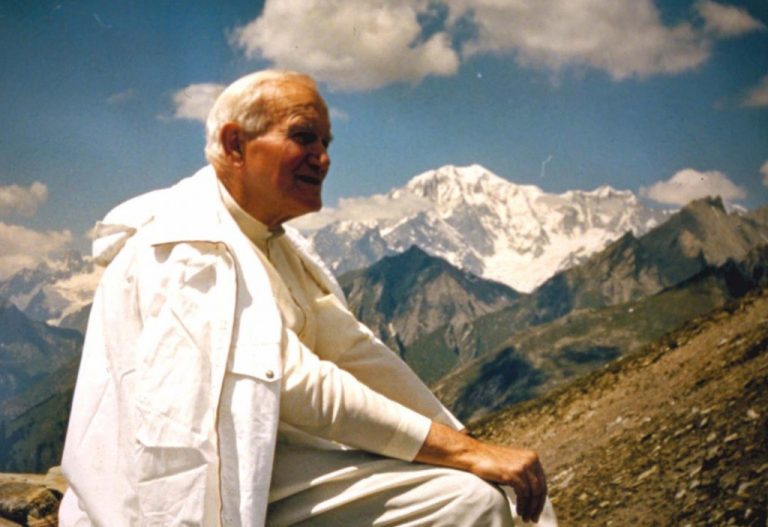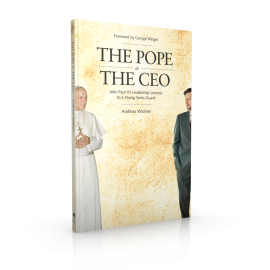By Andreas Widmer
Andreas Widmer is Director of Entrepreneurship Programs at The Catholic University of America and President of The Carpenter’s Fund. He was previously the co-founder of SEVEN Fund, a philanthropic organization run by entrepreneurs who invested in original research, books, and films to further enterprise solutions to poverty. He is the author of The Pope & the CEO: John Paul II's Leadership Lessons to a Young Swiss Guard.

When I entered the Swiss Guards, I was twenty years old and, like my fellow guards, in peak physical condition. But as fit and energetic as we were, John Paul II could still run rings around us.
That running began before 6:00 every morning when he would rise, pray, dress for the day, then head to his private chapel for more time in prayer. At 7:00 a.m., small groups of visiting dignitaries, Catholic pilgrims, or Vatican staff would join him for Mass. After Mass, guests joined him for breakfast. An hour or two of office work followed. Before greeting official visitors at 11:00, he would meet briefly with linguists to review the finer points of whatever language he would be using to speak to the visiting crowds or dignitaries. Then the audiences began.
Sometimes he spoke to thousands, sometimes only a select few; yet these audiences lasted until one or two in the afternoon. Then it was on to lunch, where various Vatican staff joined him, followed by more time for prayer, with John Paul II often heading to the rooftop gardens of the Papal Palace to walk and talk with God. After that there was more office work and more audiences, lasting right up until dinner at 8:00 p.m. when guests often dined with him. After the meal ended he would return to reading and writing and working well into the night. Sleep came around midnight or even later. Somewhere in all that, he also found time to ask a Swiss Guard about his day, chat with the sisters who cooked for him, and keep up with old friends.
That was just his Rome schedule. Compared to his schedule while traveling, it was comparatively light. John Paul II traveled far and frequently—more than any other pope in history—104 trips to 129 countries. That’s 775,000 miles or the equivalent of circumnavigating the globe 32 times.
While preparing to write this chapter, I tried to remember any times I saw that schedule taking a toll on the pope. I couldn’t. I recalled plenty of occasions when I was worn out with exhaustion. I remembered the guards who traveled with him returning home and just shaking their heads in wonder, saying, “I don’t know how the guy does it.” Not once do I recall him being bleary-eyed. In fact, it was just the opposite.
When he would return to the Vatican from weeks on the road, he didn’t head straight for his rooms and collapse in exhaustion like most would. Instead, he would stop and greet all the staff who had gathered to welcome him home. Like a general reviewing his troops, he would “inspect” us, the guards lined up in honor formation, talking to us and shaking our hands as he moved down the row. He had every right and reason to walk right past us to the calm and quiet of his apartments, but he knew it was his sacred duty to make a gift of himself to us as much as to the crowds that greeted him in foreign lands.
Day in and day out, John Paul II poured himself out in response to what God asked of him. The reason he could do that, joyfully and unfailingly, was because he knew what God had made him to do. He knew his vocation.
The term “vocation” means much more than the standard dictionary definition of “a career path or line of work.” It is more of a “calling” than a “job.” If you had to sum up the Catholic understanding of the word “vocation” in one sentence, you could say that one’s vocation is one’s mission in life. It’s what God made you to do.
You could also say it’s what you do for God. God gave you life, and now, by means of your vocation, you give it back to him.
Either way you look at it, your vocation gives meaning to your life. According to John Paul II, your vocation answers the question, “Why am I alive?” Moreover, he believed, only when you’re living out your vocation can you find fulfillment in this life. Your vocation, understood, embraced, and lived, is what makes you feel truly and fully alive.
You Might Also Like

The Pope & the CEO: John Paul II’s Leadership Lessons to a Young Swiss Guard is a guidebook for people seeking to integrate faith into all aspects of their lives—particularly their professional work. Inspired by the role Pope St. John Paul II played in the life of Andreas Widmer, a former Swiss Guard, The Pope & the CEO outlines key principles of successful leadership for executives, CEOs, entrepreneurs, small business owners, or any leader in the workplace.